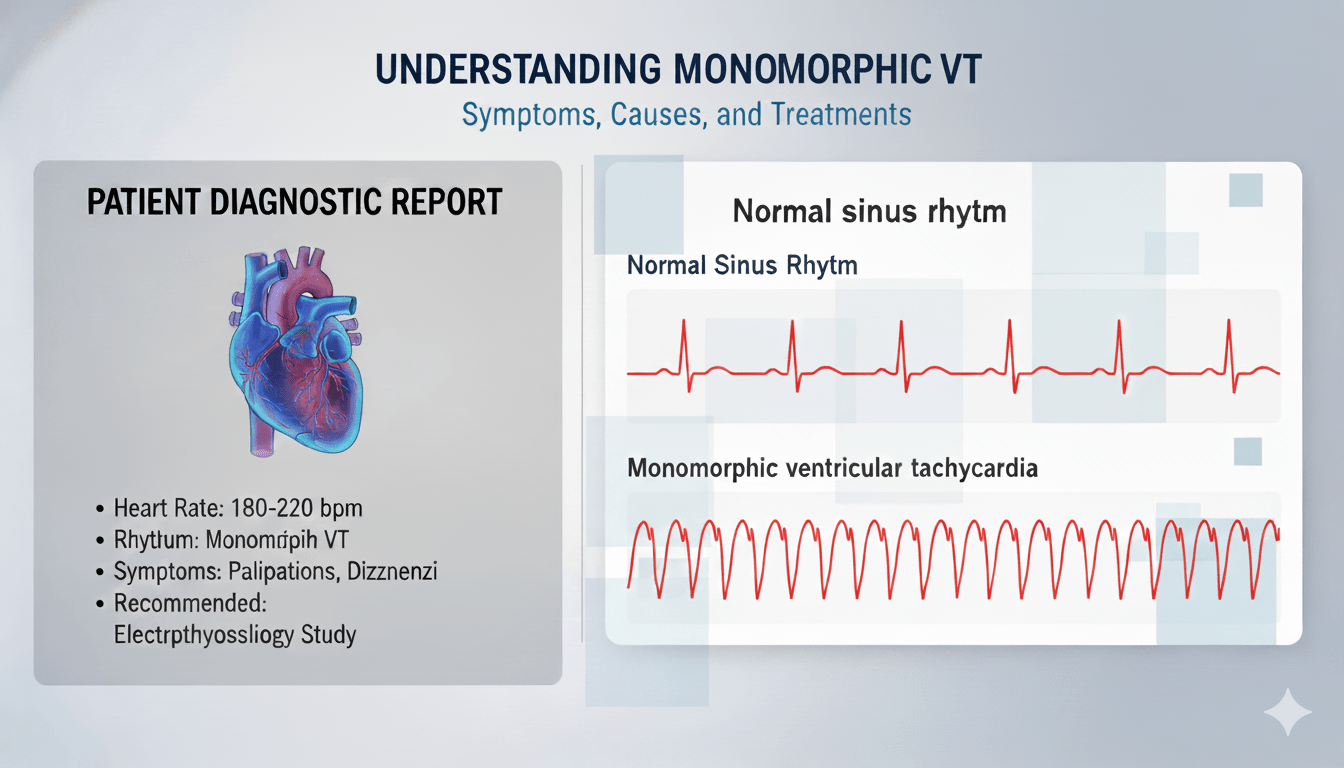
Author:- Mr. Ritesh Sharma
Experiencing heart palpitations is always a horrifying experience and it poses serious risks to our cardiovascular health. Monomorphic Ventricular Tachycardia is another arrhythmia that is associated with heart palpitations. As the name implies, this arrhythmia is characterized by a fast heart rate in the lower chamber of the heart, i.e. the ventricles.
The reason this heart disease is called Monomorphic Ventricular Tachycardia is that it originates from a single focus in the ventricles (lower chamber of the heart). In this condition, the ventricles of the human heart start beating at a threatening rate. Like any other tachycardia, it can potentially damage the heart entirely, causing it to stop beating abruptly.
Monomorphic Ventricular Tachycardia can substantially impact heart health causing complications like impaired cardiac output to increased risk of stroke to lifestyle discomfort. The risk factors of Monomorphic Ventricular Tachycardia include increased blood sugar levels, age, blood pressure, oxygen levels in the blood, cholesterol, etc.
Understanding the risk monomorphic VT poses is crucial for maintaining the ideal state of cardiovascular health. Hence, we will dive deep into the risk factors associated with it below.
Overview of Monomorphic Ventricular Tachycardia
To sum up the meaning of monomorphic ventricular tachycardia, it is the type of heart irregularities (in medical terms arrhythmia) in which the lower chamber of the heart beats rapidly exceeding the heart rate of 100 beats per minute. The following are its important characteristics:-
- The monomorphic VT is characterized by a heart rate exceeding the normal range in the lower chamber, i.e. the ventricles.
- It occurs from a single source or circuit in the ventricles, which is in stark contrast to the polymorphic VT which has multiple sources and circuits in the ventricles of the heart.
- In monomorphic ventricular tachycardia, the ventricular depolarization or QRS complex on performing an electrocardiogram (ECG or EKG) is narrow. This implies that the electrical impulses in the ventricles are following a particular pathway.
- The QRS complex in this tachycardia looks similar from beat to beat. In other words, it has a consistent morphology on performing an ECG.
- P-wave, which represents atrial depolarization, is missing in monomorphic ventricular tachycardia. This implies that it originates in the ventricles and not the atria.
- The tachycardia has hemodynamic consequences. Due to this, the person experiencing it feels dizziness, heart palpitations, chest pain and discomfort and in worst cases, loss of consciousness. Its effect on blood circulation is gauged by its duration and the heart rate.
- Monomorphic ventricular tachycardia is normally associated with coronary artery diseases, heart failures, and cardiomyopathy.
- If not treated correctly, monomorphic VT can devolve into a life-threatening arrhythmia called ventricular fibrillation, which can potentially cause cardiac arrest if it doesn’t get timely treatment.
Impact on Heart Health and Potential Complications
There are numerous potential complications that monomorphic VT can cause to heart health. Let’s elaborate on its impact on heart health and potential complications below:-
- Impaired Cardiac Output:
Monomorphic VT is capable of disrupting the normal rhythm of the heart leading to abnormal ecg waves dictated by the sinoatrial node. Due to this, the cardiac output will be reduced and the heart’s ability to supply oxygenated blood to tissues and organs will be weakened. - Reduced Exercise Tolerance:
If monomorphic ventricular tachycardia occurs again and again, it can lead to reduced exercise tolerance. You will not be able to engage in physical activities as much as you want to and will be compelled to live sedentary lifestyles. - Increased Risk of Stroke:
Because of the constant elevated heart rate in the ventricles, the risk of stroke significantly increases. The situation is further worsened by the presence of blood clots in the heart or atrial fibrillation. - Psychological Effect:
Repeated episodes of monomorphic ventricular tachycardia can result in stress and anxiety. The constant heart palpitations will induce negative life-threatening thoughts in your mind which can further worsen your cardiovascular health. - Potential Risk of Ventricular Fibrillation:
If degenerated further, the arrhythmia monomorphic ventricular tachycardia can quickly turn into ventricular fibrillation. The aforementioned arrhythmia is deadly as it can potentially cause cardiac arrest, a situation in which the heart stops pumping blood throughout the body. - Lifestyle Discomfort:
Recurring monomorphic VT can lead to discomfort in your normal lifestyle. The chest discomfort, the rapid heartbeat, and constant dizziness will make living difficult for you. - Low Blood Pressure and Cardiogenic Shock:
If monomorphic ventricular tachycardia lasts for a long period of time, it can lead to situations like low blood pressure. When the case gets too severe, the patient can faint and experience cardiogenic shock.
Identification of Risk Factors of Monomorphic ventricular tachycardia
Identifying the risk factors associated with monomorphic ventricular tachycardia involves an elaborate evaluation and an assessment of an individual’s medical history, lifestyle, and potential underlying health conditions. The following are the evaluation methods you can apply to identify the risk factors associated with the concerned tachycardia.
- Medical History:
Go through the medical history of the patient. This involves cardiovascular history, arrhythmia history belonging to this arrhythmia classification, and cardiomyopathy history. Any person affected with these heart diseases can be affected by the risks of monomorphic VT as well. - Physical Examination:
To detect the underlying cardiovascular conditions, get a physical examination done. This can identify conditions such as heart murmurs, abnormal ECG waves, or evidence of heart failure. - ECG and Holter Monitoring:
Electrocardiogram or Holter Monitoring will give you insights into the heart’s electrical activity and can competently diagnose tachycardia due to the absence of P-wave or rapid heartbeat with a narrow QRS complex. - Blood Tests:
You can get different types of blood tests done to identify the electrolyte levels in the blood. The absence of electrolytes such as potassium and magnesium can potentially cause various arrhythmias including monomorphic VT. - Lifestyle Activities Evaluation:
Evaluate lifestyle activities like excessive stress and lack of exercise to identify the occurrence of monomorphic ventricular tachycardia. - Echocardiography and Cardiac MRI:
Echocardiography and cardiac MRI can give details about the heart’s structure and functioning. This can further help in identifying the cardiac arrhythmia.
Identifying monomorphic VT is crucial as it can potentially have a negative effect on the heart. Besides this, if not identified on time, ventricular tachycardia can devolve into something as dangerous as ventricular fibrillation, which poses the risk of cardiac arrest. Timely detection will lead to prompt medical intervention and the arrhythmia can be cured before its worsening.
Preventive Measures and Risk Reduction
There are several preventive measures and risk reduction strategies you can adopt to steer clear of the risks associated with monomorphic ventricular tachycardia. The following is a list of these measures and risk-reduction strategies:-
- Medical Checkups:
Get regular medical checkups done to ensure your cardiovascular health is in perfect state. - Genetic Counseling:
Opt for genetic counseling as people with someone in the family affected with VT are likely to catch heart disease. - Lifestyle Alterations:
Make modifications to your lifestyle, such as consuming a low-sodium diet, regularly exercising, and taking anti-hypertensive medicines, if required. - Balance Electrolytes:
People who are facing electrolyte imbalances can monitor it regularly through blood tests to maintain the heart’s electrical balance. - Manage Blood Sugar Levels:
If you are diabetic, try maintaining your blood sugar levels. For this, take the correct medications, diet, and engage in physical activities regularly. - Quit Bad Habits:
Quit alcohol and smoking as it can only worsen the condition of monomorphic VT if you are affected by it. - Medical Intervention Necessary:
If you suspect any heart disease or ventricular tachycardia due to constant elevated heart rate, consult a healthcare professional as soon as possible.
Monomorphic Ventricular Tachycardia is a high-risk heart disease that can affect your heart in the worst ways possible. Hence, to not be affected by it, revamp your lifestyle, seek the help of healthcare professionals if required. While the arrhythmia is not completely curable, you can always minimize the impact of its risks by being aware of them and taking timely action.




